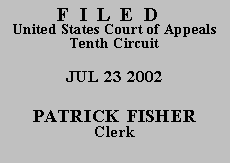

| DANIEL BEFAKADU POWELL,
Plaintiff - Appellant, Defendant - Appellee. |
No. 01-8093
(D.C. No. 01-CV-176-D) |
Mr. Powell and Allison Blumenthal obtained a divorce in the Wyoming state court system. Ms. Blumenthal now resides with the couple's children in Port Washington, New York. Subsequent to the divorce, Mr. Powell was charged and convicted of a number of federal crimes. In order to facilitate visitation with his children, Mr. Powell is currently incarcerated in the federal penitentiary in Ray Brook, New York. Despite the relative proximity to the prison, Ms. Blumenthal has chosen not to bring the children to visit their father, an act she is under no apparent obligation to undertake. Mr. Powell pursued an action in the Wyoming state courts seeking to force Ms. Blumenthal to transport the children (at her own expense) to the Ray Brook prison to visit him. The Wyoming district court declined to require Ms. Blumenthal to accede to Mr. Powell's requests. Mr. Powell appealed and the Wyoming Supreme Court denied his petition for a writ of certiorari.
Mr. Powell filed the present claim in federal district court seeking to have the federal court overturn the state court's decision. It appears from his briefs on appeal that his federal court filing is premised on the misconception that state courts are "lower" than federal courts and that federal courts may, as a general matter, review state court decisions. Noting that federal courts do not typically have jurisdiction over divorce and custody matters and that Mr. Powell did not present any argument as to why the court should take jurisdiction, the district court dismissed Mr. Powell's petition for failure to state a claim for relief and as frivolous.
Under the Rooker-Feldman doctrine, federal courts do not have jurisdiction "'over challenges to state-court decisions in particular cases arising out of judicial proceedings even if those challenges allege that the state court's action was unconstitutional.'" Johnson v. Rodrigues (Orozco), 226 F.3d 1103, 1108 (10th Cir. 2000) (quoting District of Columbia Court of Appeals v. Feldman, 460 U.S. 462, 486 (1983). In Johnson, we held the federal court did have jurisdiction because the appeal challenged the constitutionality of Utah's adoption laws more generally, not the specific decision of a state court on a domestic relations question. See id. In the case before us, however, Mr. Powell is challenging the particular outcome of his case. While he purports to state a claim under the United States Constitution and the Americans with Disabilities Act, we see no possible bases for those claims as applied to Ms. Blumenthal. We thus agree with the district court that this case is one over which the federal courts do not have jurisdiction.
We GRANT the motion to proceed in forma pauperis and AFFIRM the decision of the district court.
ENTERED FOR THE COURT
Stephanie K. Seymour
Circuit Judge
*.After examining appellant's brief and the appellate record, this panel has determined unanimously that oral argument would not materially assist the determination of this appeal. See Fed. R. App. P. 34(a)(2) and 10th Cir. R. 34.1(G). The case is therefore submitted without oral argument. This order and judgment is not binding precedent, except under the doctrines of law of the case, res judicata, or collateral estoppel. The court generally disfavors the citation of orders and judgments; nevertheless, an order and judgment may be cited under the terms and conditions of 10th Cir. R. 36.3.
1. Mr. Powell also filed a motion with the district court to proceed in forma pauperis. That motion was denied. He renewed his application on appeal and the clerk allowed for payment of fees in partial payments. To date, Mr. Powell has failed to make any payments. While we grant Mr. Powell's motion to proceed in forma pauperis, we remind him that such grant does not absolve him of the duty to pay costs and fees. It simply allows him to make those payments in installments.